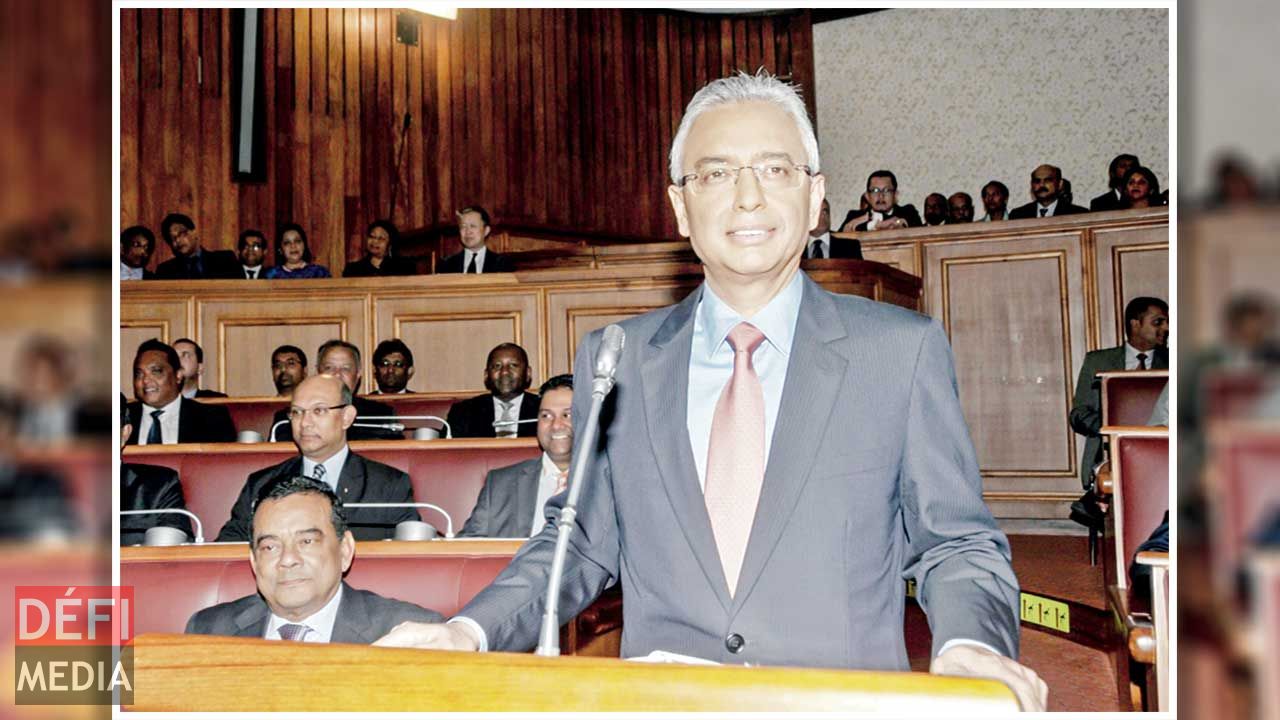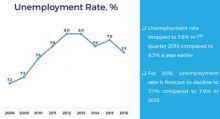
In view of the next Budget, the traditional pre-budget consultation exercise with various social and economic stakeholders has already started. Each stakeholder is coming up with its list of proposals. But what about the measures announced in the last Budget? Have they all been already implemented?
Publicité
 The Budget last year revolved around ten key strategies. It was said to be a turning point in the way Budgets are prepared and measures implemented in Mauritius. In February last, the Finance Minister, who chairs the ministerial committee for monitoring the implementation of measures, stated that he is satisfied with the overall progress. It was estimated that nearly 80 percent of announced measures had already been implemented. Among the pending ones, there are such important measures as the setting up of a National Employment Agency to facilitate interaction between job seekers and employers. A National Employment Policy Framework is currently being worked out. On the other hand, the announced that the ‘Skills Development Authority’ is yet to be created. This will be an independent regulator in the training sector and will oversee polytechnic centres, in the wake of a review of the Technical and Vocational Education and Training.
The Budget last year revolved around ten key strategies. It was said to be a turning point in the way Budgets are prepared and measures implemented in Mauritius. In February last, the Finance Minister, who chairs the ministerial committee for monitoring the implementation of measures, stated that he is satisfied with the overall progress. It was estimated that nearly 80 percent of announced measures had already been implemented. Among the pending ones, there are such important measures as the setting up of a National Employment Agency to facilitate interaction between job seekers and employers. A National Employment Policy Framework is currently being worked out. On the other hand, the announced that the ‘Skills Development Authority’ is yet to be created. This will be an independent regulator in the training sector and will oversee polytechnic centres, in the wake of a review of the Technical and Vocational Education and Training.
Manufacturing: No bike factory?
The 2016/2017 Budget mentioned the presence in Mauritius in July 2016 of an Indian business delegation prospecting the setting up of a bike factory in Mauritius, with the objective of exporting bicycles and motorbikes to the African region. The project was to create many jobs. Bus so far, nothing has been heard. Similarly, the setting up of a pharmaceutical village at Rose Belle is also high on the agenda but the project is taking time. Another announced initiative is the reopening of the former tea factory at Dubreuil, to promote tea and other agro processing activities.
National Payment Switch
The Bank of Mauritius will come up with a National Payment Switch to reduce transaction costs and give a boost to e-commerce. A National Payment Bill will have to be introduced in Parliament. The objective is to better regulate e-payment transactions.
E-commerce platform
Another project in the making is the development of a national e-commerce platform to connect consumers from the rest of the world directly to our exporters. This project will be spearheaded by the MEXA, with the collaboration of government.
E-licensing
The government wants to tackle tedious paperwork in our public administration system. In this endeavour, the setting up of an e-licensing platform was announced to provide a single point of entry for applications for permits and licences. The project is currently at the tender stage, and will be financed by a grant from the European Union.
Rural regeneration
Many problems (as we have recently seen during the heavy rains) stem from poor planning in both urban and rural regions. To overcome this, there is a dire need for rural and urban regeneration programmes, as announced last year. In this context, the Town and Country Planning Board will be transformed into a more functional National Planning Commission. So far, there is no indication of where matters stand. Another thorny issue is that of the rural tax. No government has had the courage to impose municipal rates in the rural areas, as is the case in the towns.
Mergers
As announced last year, the State Property Development Company (SPDC), the State Land Development Company (SLDC), the Business Parks of Mauritius Ltd (BPML), Le Val Development Ltd and Les Pailles Conference Ltd have all been merged to form a single entity, Landscope (Mauritius) Ltd. Other announced mergers are yet to be realized, for example the merger of the Information Communication Technology Authority (ICTA) with the Independent Broadcasting Authority (IBA), or that of the Mauritius Housing Company (MHC) with the National Housing Development Company (NHDC). The announced merger of the Registrar General Department with the Mauritius Revenue Authority has triggered protests from employees.
Budget proposals
News on Sunday has sought the views of economists who regularly contribute to this page on budget proposals. Arvind Nilmadhub, Gavin Ng, Zohra Gunglee, among others are unanimous: To attain the next wave of growth the country so badly needs, it is imperative that the government comes up with robust, bold and radical measures.

Entrepreneurship
Our economists propose that small and medium enterprises whose turnover does not exceed Rs 500,000 per annum should be exempted from the payment of corporate tax. This will give them substantial relief, as they would not have to worry about tax issues and complex returns.
Automobile
It is time that the National Transport Authority be completely streamlined in order to rid it of obsolete procedures. In this context, the government should consider the abolition of the road tax in its current form, as it does not serve any useful purpose in a small country like ours. The alternative is to incorporate it as a form of levy in the price of fuel. Thus, the more a vehicle is used, the more tax is collected by the government.
Registration
Mauritians spend a lot of money in registration duties and fees, whether on vehicles or immovable property. When it comes to vehicles, the tariff of registration duties does not make sense. In the automobile sector, aggressive marketing and ever changing needs stimulate the market and people tend to change vehicles more often. Another trending concept is vehicle exchange, but each time there is a transfer, a registration fee applies. This should be reviewed.
Protect small businesses
Government should find a way to provide public parking zones in major business centres in regions like Triolet, Montagne Blanche, Goodlands, Flacq, St Pierre, Bambous, Chemin Grenier, etc, as small shops are losing customers to big supermarkets and commercial complexes because shoppers find difficulty in parking their car.
Trade Fee
Last year, government, in a bid to encourage SMEs, came up with the abolition of trade fee for all trades where the fee payable is up to Rs 5,000. But this blanket exemption also benefits businesses with high turnover running in millions! Secondly, trade fee, the way it is now is discriminatory, as businesses pay the same amount irrespective of turnover level. To be fair, the trade fee in its current form should be abolished and replaced with a service fee payable by businesses to local councils based on the level of service (refuse collection, etc) they receive.
Non-retired citizens
Thousands of high net worth retired non-citizens have chosen to settle in Mauritius. Many of them are seasoned businessmen, entrepreneurs or former professionals in various sectors. These people can be called upon to contribute to society and to the economy on a voluntary basis, in order to help them integrate into our Mauritian society. Thus, we can see transfer of skills, knowledge and ideas. Retired professionals can also become mentors to small entrepreneurs and young graduates. There should be a mechanism to enable such endeavours.
Productive sectors
The onus is too much on property development projects, with productive sectors like agriculture, agro-processing and manufacturing taking a backstage. It is imperative that this tendency be reversed in order to boost productive sectors that can provide durable jobs and opportunities. Opportunities abound but there is a lack of information available to the public and the small entrepreneurs’ community.
Real estate speculation
To reduce speculations in the real estate sector and deflate property prices, they propose that the government comes up with a planning scheme to render locked land outside settlement boundaries more accessible and attractive, with investment in roads, drains and utilities. This will increase supply and stabilize prices and will also allow more landowners to enter the property market. The market will be more buoyant and economic spillover will further create jobs and opportunities. In the same vein, the government should negotiate with the sugar industry to obtain a few thousand hectares of land which it can then use to redistribute.

Notre service WhatsApp. Vous êtes témoins d`un événement d`actualité ou d`une scène insolite? Envoyez-nous vos photos ou vidéos sur le 5 259 82 00 !


















![[Info Soirée] : «Nou pe tann plizir versyon lor kouma li finn mor»](https://defimedia.info/sites/default/files/styles/square_thumbnail/public/thumbnail_020324.jpg?itok=7TQV0PDv)





